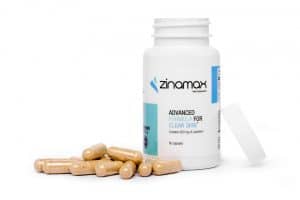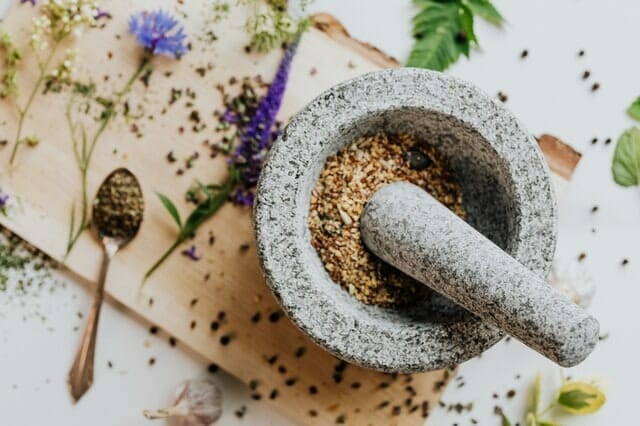Herbs for seborrhea are one of the most effective ways to reduce annoying symptoms related to excessive sebum secretion by sebaceous glands. Apart from using medications, supplements and cosmetics reducing seborrhea, it is worth including herbal treatments in the list of home treatments. Regular use of herbs is a way to normalize the activity of sebaceous glands and stimulate repair processes. Remember that seborrhea often leads to skin diseases, both of the scalp and skin on other areas of the body, so it is worth to start fighting it as soon as possible. Herbal remedies can help reduce seborrhea and improve skin and hair aesthetics as well as limit the progress of seborrhea-related diseases.Herbal remedies can help to reduce seborrhea and improve skin and hair aesthetics as well as limit the progression of seborrhea related diseases if they already exist.
Table of contents
What is seborrhea? Symptoms and effects of seborrhea
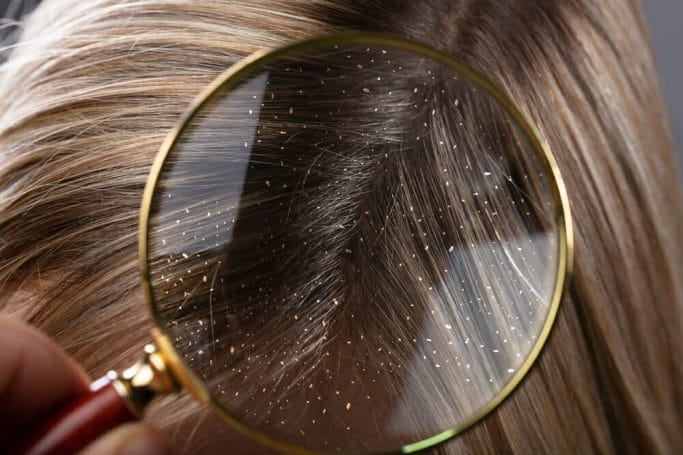
Seborrhea is a common condition resulting from a malfunction of the sebaceous glands. When the skin works normally, the sebaceous glands secrete small amounts of sebum, which is systematically removed with skin cleansing and exfoliation. In the case of seborrhea, however, there is an increased activity of the sebaceous glands. Excess sebum secreted begins to accumulate on the surface of the skin and clog pores.
In case of seborrhea, despite skin care treatments, the skin becomes excessively flaky. It is shiny, greasy, sticky, prone to the formation of blackheads and eczemas and prone to inflammation. Pores are enlarged and blocked. Other frequently observed symptoms include: skin redness, itching and burning, excessive hair loss and excessive greasiness (unsightly, greasy hair even shortly after washing).
What is worse, the skin, on which seborrhea occurs, is an ideal environment for the multiplication of pathogenic bacteria, viruses and fungi. Therefore, the consequence of seborrhea is often the development of various skin diseases.
Diseases associated with seborrhea are:
- Seborrheic dermatitis,
- Seborrhoeic dermatitis (skin lesions appear mainly on the face, chest and joint folds),
- psoriasis of the scalp,
- skin psoriasis (lesions mainly appear on the elbows and knees),
- ringworm,
- seborrheic alopecia,
- seborrheic dandruff (greasy dandruff),
- dandruff,
- acne vulgaris,
- rosacea.
Seborrhea appears in places where there are most sebaceous glands outlets, so primarily on the hairy scalp and on the scalp.The most common causes of seborrhoea are the following: seborrhoea, seborrhoea, seborrhoea, seborrhoea, seborrhoea and seborrhoea.
The most common causes of seborrhea
There are various causes of seborrhea, but hereditary factors play the biggest role here. If the parents or grandparents struggled with seborrhea, it is likely that the tendency will be passed on to future generations.
Factors influencing increased sebum production and development of seborrhea are:
- genetic predisposition,
- hormonal disorders (mainly excess of sex hormones such as androgens and progesterone),
- weakened immunity,
- improper hygiene,
- bad weather conditions (e.g. high frost, high heat),
- stress,
- environmental pollution,
- yeast infections,
- certain diseases (e.g. AIDS, neurological diseases),
- overweight and obesity,
- poor diet, deficiencies of certain vitamins,
- use of pharmaceutical and cosmetic preparations that are too aggressive for the skin, sterilizing.
Check the preparation, thanks to which you will get rid of parasites, harmful microorganisms and toxins: Detoxyn
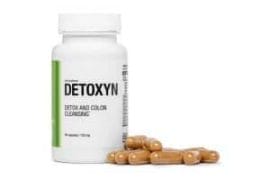
How to fight seborrhea and prevent skin diseases caused by seborrhea?
It is worth to start fighting seborrhoea as early as possible, either with home remedies or with the assistance of a dermatologist. The sooner we deal with seborrhea, the lower the risk of skin diseases occurrence and intensification.
Reduction of seborrhea is based primarily on systematic, appropriate skin care. If the problem is exacerbated, it is worth consulting a doctor and using recommended pharmacological agents.
Home Remedies for Seborrhea – 3 valuable tips how to get rid of seborrhea
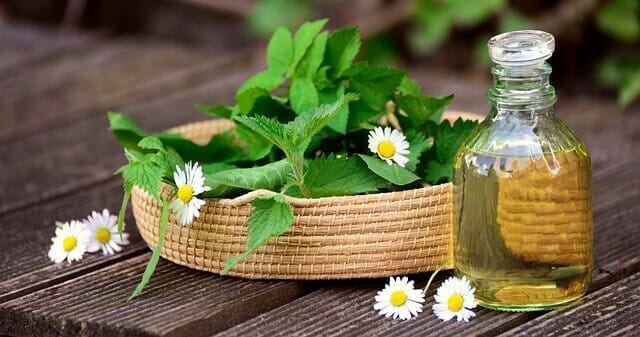
Seborrhea is an annoying, quite difficult to fight, tending to return and exacerbate, and what’s worse, unsightly, often causing discomfort, very embarrassing affliction. Wanting to get rid of seborrhea and skin or hair problems caused by it, we can use the intervention of a dermatologist or make a home treatment.
Applying the following tips, we will manage to “calm” the work of the sebaceous glands, normalize skin functions, cleanse it thoroughly and stimulate regeneration processes!
Let’s start with nutrition!
Nutrition largely affects the condition and functioning of the skin. Poor diet and deficiencies in some nutrients may be a factor in exacerbating seborrhea. Therefore, it is worth to switch permanently to a healthy diet filled with good quality natural products and avoiding highly processed food.
In the daily menu we should especially take care of the presence of products rich in components such as: vitamin A, vitamin E, B vitamins (especially B2, B3), vitamin C, zinc, selenium, copper, sulfur, omega 3 acids and protein.
Take care to choose the right cosmetics!
In fighting seborrhea, the process of cleansing the skin and exfoliating dead epidermis is very important. Cosmetics for seborrheic skin should, however, be devoid of aggressive substances such as alcohol or glycol, because they can exacerbate inflammation, sterilize the skin and aggravate skin and aggravate skin problems (excessive exfoliation causes the sebaceous glands to produce more and more sebum).
For cleansing the skin we should use light, delicate foams and gels with properties regulating the production of sebum. For everyday facial skin care, toners with antibacterial, pore-reducing, exfoliating and mattifying properties (e.g. with salicylic acid) will also work. From time to time it is worth to apply a peel-off mask on the face.
Gentle gels with antibacterial, anti-inflammatory and sebum-reducing properties, which regenerate and soothe irritation will work well for body cleansing. Once or twice a week it is also worthwhile to perform an exfoliating scrub.
If we struggle with seborrheic dandruff, we should always have a good quality anti-dandruff shampoo on hand. Specialty shampoos with selenium sulfide as an active ingredient are highly effective against dandruff and seborrheic dermatitis. It has a strong bactericidal and fungicidal effect and prevents excessive peeling of the epidermis. Homemade herbal rinses are also helpful for seborrheic dermatitis and dandruff.
3. Opt for herbal treatments!
Herbal treatments with herbs and oils can be very helpful in the fight against seborrhea and ailments like seborrheic dermatitis, dandruff or psoriasis.
For example, tea tree oil with its strong antibacterial, antifungal, anti-inflammatory and cleansing properties will come in very handy. You can use the oil to massage your scalp and get rid of harmful microbes, reduce flaking, reduce itching and stimulate skin regeneration. Tea tree oil can also be used as an ingredient in homemade face and body masks.
It is also perfect for masks, scrubs, compresses and anti-seborrhea rubs.For masks, scrubs, compresses and rubs to counteract seborrhoea also green clay, which has anti-inflammatory properties and thoroughly cleanses, as well as apple cider vinegar– disinfecting, removing harmful microorganisms and regulating the production of sebum. Other ingredients worth using for home anti-seborrhoea treatments are:
- lemon juice,
- aloe vera,
- shea butter,
- essential oils (e.g. clove, eucalyptus, chamomile, almond, cottonseed, hemp, rosemary),
- coconut oil,
- spices such as cinnamon, ginger, turmeric,
- propolis.
Herbal resources also often play a significant role in home treatments for seborrhea. What herbs to choose for seborrhea?
Herbs for seborrhea – which are the best?
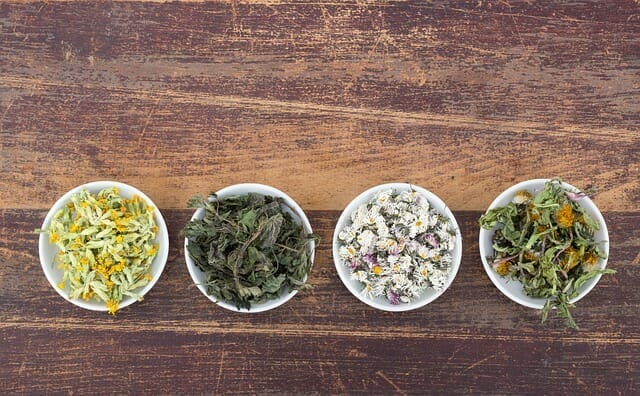
Phytotherapy (treatment with plant raw materials) is popular in the prevention of a wide variety of conditions, including skin diseases. Here are herbs that, due to the bio-substances and valuable properties they contain, are worth using in home treatment against seborrhea and related diseases.
Sweet Rush
Sweetcalamus is a versatile medicinal plant with many valuable properties. One of its most common uses is to combat seborrhea and skin diseases. It contains organic acids, mineral salts, tannins, terpenes, choline and essential oils.
Calamus has a very beneficial effect on the skin and hair. It has a soothing effect, reduces redness and itching, soothes irritation, calms the work of sebaceous glands and regulates sebum secretion. At the same time it fights inflammation and harmful microorganisms. It prevents dandruff and alopecia, strengthens and protects hair, adds shine and improves its appearance.
Calendula
Calendulaflowers are among the top phytonutrients fighting seborrhea. They are rich in beneficial mucilages which show protective, soothing and regenerative properties. Other valuable substances contained in Calendula are: terpenes, tannins, vitamins and mineral salts, resins, saponins. Thanks to its exceptionally strong composition, Calendula is an effective weapon against skin inflammations. It is also helpful in fighting bacteria and fungi and normalizing sebum secretion. It accelerates wound healing, soothes irritation, leaves the skin smooth, well-moisturized and soft.
Calendula also has a positive effect on hair. It fights inflammations, soothes the scalp, nourishes hair and reduces seborrhea. Since calendula also has a positive effect on blood vessels (seals and strengthens them), it can also be a valuable support for people dealing with spider veins, varicose veins, facial erythema and skin discoloration.
Burdock
Burdock is a member of the Asteraceae family, found mainly in Europe and Asia, it is a very widespread plant, found throughout Poland. Burdock is counted among the most valuable, most frequently used and most effective herbs in fighting skin ailments, including those related to the scalp and hair, such as dandruff, hair loss, slowed hair growth, baldness, excessive greasy hair.
Burdock contains antioxidants, polyacetylene compounds, sesquiterpenes, flavonoids, tannins, inulin, organic acids, sulfur compounds. The herb has antifungal, antibacterial and anti-inflammatory properties. It has a regenerating and strengthening effect on thin, thin, weak, damaged and falling out hair. It strengthens hair bulbs and follicles and repairs damage in the hair structure. Burdock extracts can be found in numerous shampoos, conditioners, hair balms and dietary supplements. You can also buy burdock root in crushed form in herbal shops.
Angelica
Angelica belongs to the celery family. It is found mainly in Asia and Europe. Angelica root is a valuable herbal raw material, used internally (in the form of infusions and tinctures) in digestive ailments and nervous tension, as well as externally (in the form of poultices, poultices, poultices, poultices).The herbal herb is used internally (in the form of infusions and tinctures) for digestive disorders and nervous tension as well as externally (in the form of compresses, poultices, rubs) for dermatological disorders (psoriasis, acne), including scalp diseases (dandruff, seborrheic alopecia, seborrheic dermatitis). It is also used in excessive greasiness of hair.
Angelica has anti-inflammatory and antibacterial properties, soothes itching, soothes irritation, reduces seborrhea of the scalp. By restoring balance to the scalp, it contributes to the improvement of hair quality. At the same time it nourishes hair, strengthens hair roots and prevents hair loss. Angelica composition includes: sesquiterpenes, organic acids, mineral salts, vitamins, coumarins, tannins, flavonoids.
Willow
Willow is one of the most common trees, endowed with exceptional decorative values. It is also used in natural medicine. Its bark is used as a medicinal material. Willow contains: organic acids, salicin, bioflavonoids, bitters, resins, tannins, phenolic acids, mineral salts.
Willow shows strong anti-inflammatory, antibacterial, skin normalizing and disinfecting properties. Thanks to these actions, it works perfectly as a natural remedy for seborrhea and various symptoms associated with seborrheic dermatitis, such as dandruff, itching or intense greasiness of hair. By strengthening and improving the condition of hair, it also reduces its susceptibility to hair loss.
Other valuable herbs for seborrhea:
- sage,
- rosemary,
- arnica,
- chamomile,
- St. John’s wort,
- nettle,
- violet,
- common rue.
Check the effective remedy for problematic skin: Zinamax
